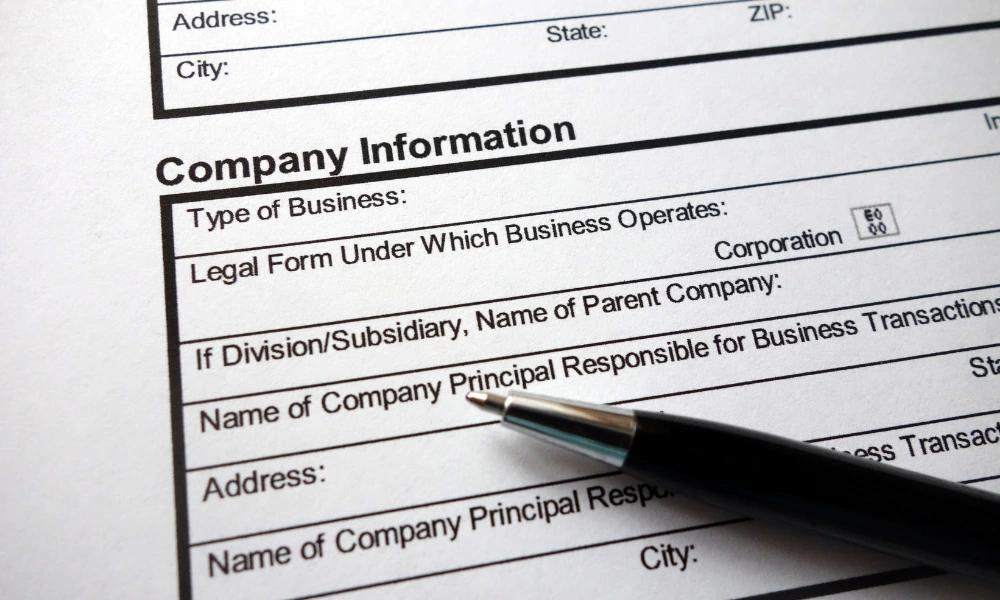Form 8832: Your Options For Filing Status

Dealing with business taxes can quickly turn into a headache. Imagine you have a limited liability company (LLC), for example, which means you’ll be dealing with an entity classification election. Your tax burden has increased as your business has grown, too, and you might feel you need to do something to change how your taxes are calculated to reduce your tax bill.
Enter IRS Form 8832.
Form 8832 determines how a business is classified for tax purposes, including as a corporation, as a partnership, or as an entity disregarded as separate from its owner. The form notifies the Internal Revenue Service (IRS) that you want to change your business from its default filing status, a move that can then change your tax rates.
This is not a decision to be taken lightly, however. Working with an experienced tax advisor can make it easier to make decisions about your company’s filing status — including your classification — and help you fill out the form properly for the IRS.
Filing Form 8832
There are several reasons your company might choose to file Form 8832 and change your filing status. You might want to:
1. Lower Your Tax Bill
Different types of corporations are taxed in different ways. When you first put together a new business entity, for example, it usually gets classified by default as an LLC. As an LLC, the IRS essentially considers your business not separate from you.

By changing your filing status, you can pay corporate taxes rather than including your business income and expenses with your personal taxes. This strategy also helps separate your business and personal income, which can prove highly beneficial for some business owners.
2. Assign Your Initial Classification
When you create a new business, the IRS will consider it an LLC by default. Filling out Form 8832 means you can quickly establish your company as the type by which you want to be regarded. You would ideally want to do this as you file the rest of your business paperwork, since it can make a big difference in how you manage your federal tax returns.
What Classifications Are Available?
Your company can be qualified as an S-corporation, a C-Corporation, or as a sole proprietor or partnership. Each has distinct tax requirements. Working with a tax consultant can help you make the right decision about how to classify and manage your business entity.
S-Corporation
In an S-Corp, the entity itself does not get taxed. Instead, funds pass through the corporation, and the participants in the S-Corp are taxed based on their individual income from the corporation. S-Corp holders do not have to pay self-employment taxes on their share of those profits, which can prove beneficial for a single-member, small business corporation.
C-Corporation
A C-Corp is recognized by the IRS as a separate taxable entity. C-Corps get taxed directly, and shareholders cannot count company losses as personal losses. Individuals who receive dividends from the C-Corp must pay taxes on the dividends as they are distributed.
Sole Proprietorship/Partnership
Sole proprietors and partners must report business income on their personal income tax forms. They do not have to manage taxes separately for their businesses, but must instead make sure that they include all profits and losses on their personal income tax statements. Partnerships use the same basic setup as sole proprietorships, but profits and losses get split between the owners.
What You Need to Know About Filling Out IRS Form 8832
Working with a tax advisor can make it easier to collect all the information you need if you’re filling out Form 8832 for the first time. Collecting the right documentation before you get started can help you move forward quickly with your plans.
What Information Do You Need?
To fill out Form 8832, you will need:

- The business address and phone number
- The business’s name
- Your employer identification number (EIN)
- The name of the business owner and his/her Social Security number, in the case of a single owner
Potential Problems Filling Out Form 8832
As you’re filling out Form 8832, there are some problems you could encounter along the way — most of them related to choosing the wrong form.
1. As a Sole Proprietor, You Cannot Go Directly to Filling Out Form 8832
You will need to form an LLC first. Consult a tax advisor to learn more about how to form an LLC and what it will mean for your business. Creating a member LLC has a number of personal advantages. It helps separate your personal assets from business assets, for example, which means you can help protect your personal finances if the business fails. As a member LLC, you can also choose to transition to a different type of company at a later date.
2. If You Are an LLC and Want to Form an S-Corp, You May Want to Fill Out Form 2553 Instead
This form often proves much simpler to fill out, making the transition to an S-Corp easier. Consult a tax advisor to learn more about the right paperwork for you. You may want to discuss which type you want to be taxed as before filling out any paperwork.
3. As a Corporation Filing to Transfer Status to an LLC, You Cannot Use Form 8832
You will, instead, need to transition your business to a different type of legal entity. A tax advisor can help you learn more about that process. Keep in mind that as an LLC, you may need to incorporate the business’s taxes into your personal income. A tax advisor can help you prepare for that ahead of the due date, as well.
4. Timing Matters
There is no specific deadline for when you must file Form 8832, but it does change the way you calculate your business taxes for the year. Your new tax classification cannot start more than 75 days before the filing date on the form. Keep your finances in order by making sure you know how that transition will impact your taxes for the coming year.
Learn More About Form 8832
Filling out Form 8832 can help transition your business’s tax status, often saving you money on your tax bill. Contact Silver Tax Group today to discuss your Form 8832 questions, or to speak with our experts about any other tax-related questions you might have.





Free Consultation 24/7
Chad Silver
Attorney

Silver Tax Group Locations


777 South Flagler Drive
Suite 800 – West Tower
West Palm Beach FL 33401

4005 Guadalupe St
Suite C
Austin, TX 78751


